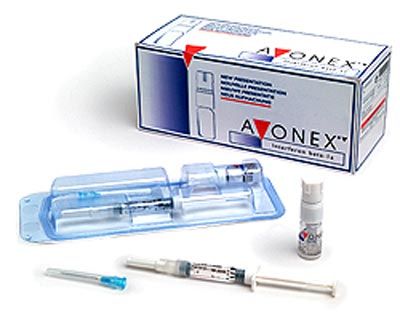
There are several injectable disease-modifying drugs on the market today to slow patients’ courses of relapsing-remitting multiple sclerosis. These medications are defenses against the number and severity of future relapses and resulting disability. The drugs range in effectiveness and are therefore used for different severities of RRMS. At this time, these drugs are only indicated for relapsing-remitting MS and are not definitely proven to help progressive courses, although a couple of the medications are still used for this purpose. No medications are 100% effective and there is currently no cure for multiple sclerosis.
Avonex* is one of the said injectable drugs, and like all of the other medications, it comes with its advantages and its drawbacks. It is a manufactured interferon— specifically beta-1a— which is a protein that is also naturally produced by the body. Avonex has been proven to reduce the number and severity of MS relapses in patients, as well as the level of disability caused by relapses, and it has been on the market since 1996.
Avonex’s Advantages:
- The medication is only administered once a week, as opposed to the other drugs, one of which is injected daily
- Avonex can be received in prefilled syringes or easy packets which can be mixed by the patient
- The administration of Avonex causes less site reactions than most of the other medications
- Avonex has more than 10 years’ worth of proven results
Avonex’s Drawbacks:
- Being one of the interferon medications, Avonex can cause flu-like side-effects (fever, chills, nausea, and aches) for up to two days after a shot is administered
- Avonex is the only medication that is injected intramuscularly (IM), and so it has the longest needle
- Avonex can cause any of the following side-effects: depression, anemia, seizures (rare), heart abnormalities (rare), abnormal liver function readings, thyroid abnormalities, and reduced immunity to infections and illnesses
- Avonex is thought to be the least effective drug for MS because it has the lowest dose with the least amount of administrations. Rebif, another drug with the same chemical composition, is given at a higher dose (subcutaneously or just under the skin) several times a week.
*any decision to take medication should be thoroughly discussed with your doctor

